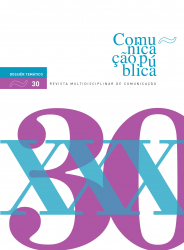Consumption, environment, and advertising communication
a reflection based on the complexity of time
DOI:
https://doi.org/10.4000/cp.12725Keywords:
consumption, environment, complexity, advertisingAbstract
Consuming is not only a necessity for our own survival, but also a form of communication, in which goods and services express time. Excessive consumption and planned obsolescence of products created a culture of waste, with devastating results, capable of jeopardizing the survival of the human species. Added to this catastrophic situation are the social inequalities, that are proliferating all over the planet.
It is imperative to provide valid answers that mitigate these serious problems and to find valid solutions. It is necessary to analyze what is happening in a complex, non-linear way, framing integrative, balanced, pluralistic, creative, and, at times, paradoxical postures, which may reflect the complexity of the problems.
Therefore, it is intended to reflect on these problems, also making an approach to their complexity, in order to show that thinking towards identifying a possible resolution of these problems requires framing complex thinking as an essential presupposition. This broad objective leads us to the next objective, which frames the individual as a building entity, as well as organizations as fundamental socioeconomic structures in the search for the necessary and urgent balance.
In terms of methodology, this reflective essay involved an exploratory attitude, calling for some of the thought that we consider most fruitful, but in which a markedly authorial stance also emerges.
Downloads
References
Attenborough, D. (2020). Uma vida no nosso planeta. Temas e Debates, Círculo de Leitores.
Bauman, Z. (2001). Modernidade líquida. Zahar.
Bauman, Z. (2008). Vida para consumo: a transformação das pessoas em mercadorias. Zahar.
Benjamin, W. (2017). O Anjo da História. Assírio & Alvim.
Canclini, N. (2015). Consumidores e cidadãos: conflitos multiculturais de globalização. Editora UFRJ.
Cañeque, F. (2016). Carencias, complejos y expectativas de la empresa responsable en el siglo XXI. Digitalia.
De Bono, E. (1990). Lateral thinking. Penguin.
Eliot, T. S. (1934). The Rock. Faber & Faber.
Fajardo, E. (2010). Consumo consciente, comércio justo. Senac Nacional.
Fontenelle, I. (2010). O fetiche do eu autônomo: consumo responsável, excesso e redenção como mercadoria. Psicologia & Sociedade.
DOI : 10.1590/S0102-71822010000200002
Govatto, A. (2007). Propaganda Responsável. Editora Senac.
Jhally, S. (1995). Os códigos da Publicidade. Edições Asa.
Leonard, A. (2010). A história das coisas. Zahar.
Lindstrom, M. (2009). A lógica do Consumo: verdades e mentiras sobre por que compramos. Nova Fonteira.
Lipovetsky, G. (2006) A felicidade paradoxal: ensaio sobre a sociedade do hiperconsumo. Edições 70.
Mackey, J. & Sisodia, R. (2014). Conscious Capitalism. Liberating the heroic spirit of Business. Perseus Books Group.
McCracken, G. (2003). Cultura e consumo: novas abordagens ao carater simbólico dos bens e das atividades de consumo. Mauad Editora.
Mert, G. (2020). Management & Strategy. In H. Çi̇çekli̇oğlu, (Ed.), Vuca concept and leadership (pp. 229-244). karadeni̇z ki̇tap Ltd. STİ.
Moles, A. (1995). As Ciências do impreciso. Edições Afrontamento.
Morin, E. (2005). Ciência com Consciência. Bertrand Brasil.
Morin, E. (1991). Introdução ao pensamento complexo. Instituto Piaget.
Nova Fronteira.
Müller, M. & Mesquita, F. (2018). Admirável moda sustentável, vestindo um mundo novo. Adverte.
Rosnay, J. (1995). O macroscópio. Estratégias Criativas.
Schaun, A. & Utsonomiya, F. (org) (2010). Comunicação e Sustentabilidade: conceitos, contextos, experiências. E-papers.
Serva, M. (abr./jun. de 1992,). O paradigma da complexidade e a analise organizacional. Revista de Administração de Empresa, 32(2), 26-35, https://www.scielo.br/j/rae/a/Fh3cSKhrMwGg5KjkfdRszkD/?lang=pt&format=pdf
DOI : 10.1590/S0034-75901992000200004
Serva, M., Dias, T. & Alperstedt, G. D. (jul./set. De 2010). Paradigma da complexidade e teoria das organizações: uma reflexão epistemológica. ERA, 30(3), 276-287. https://www.scielo.br/j/rae/a/69qXg9JnDdXvQjJYsN7KhQQ/?lang=pt&format=pdf
Downloads
Published
Issue
Section
License
Copyright (c) 2021 Direitos do Autor (c) 2021

This work is licensed under a Creative Commons Attribution-NonCommercial 4.0 International License.
Os conteúdos da Comunicação Pública estão licenciados com uma licença Creative Commons - Atribuição-NãoComercial 4.0 Internacional.


